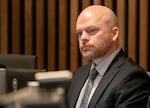PCEF committee considers pitch to help Portland’s budget crisis with a loan from the clima
May 8, 2025
The Portland Clean Energy Fund committee is once again considering a proposal to use its funds toward the city’s general budget.
This time, a city councilor has suggested that Portland borrow from the voter-approved climate fund to help the city avoid layoffs and program cuts outlined in the mayor’s current budget proposal.
On Wednesday, Portland District 4 Councilor Mitch Green formally introduced the Healthy Parks, Healthy Climate Plan loan proposal to the PCEF committee. Under Green’s proposal, Portland could borrow up to $80 million from the climate action program’s reserves to help fill the city’s looming $93 million budget gap, then pay that loan back with interest over a period of three years.

This comes as Portland Mayor Keith Wilson’s proposed budget, released on Monday, would gut hundreds of jobs, including cuts to the Portland Parks & Recreation that would reduce maintenance and cleaning in city parks. That’s even though the city already expects to receive nearly $19 million from PCEF’s generated interest.
Several city councilors have proposed using PCEF funding to bridge Portland’s massive budget gap since City Administrator Michael Jordan released recommendations in February. In a span of a few months, councilors have recommended increasing the existing 1% tax on large retailers to 1.33% or using reserve PCEF funds to build sidewalks.
Green said he wanted to provide an alternative by proposing the city borrow PCEF funding rather than reappropriating allocated funds, which would “be sort of an implicit defunding” of the clean energy fund’s $1.5 billion five-year plan.
“I started thinking about, how can I offer something that provides an alternative to coming and raiding the fund while also being responsive to some of the things I’ve been hearing in the community at these budget listening sessions,” he told the PCEF committee Wednesday. “So in broad strokes, it’s really quite simple, essentially we would ask the PCEF committee to think about and potentially recommend to council a loan from the PCEF contingency balance.”
Bottom line, Green said, his proposal should be used as a last resort.
“We’re in a moment where Portlanders are really wondering what kind of priorities we’re going to make in the city and what the mayor has proposed are pretty deep cuts in parks maintenance,” he said. “This is a method to keep those parks maintenance whole, show voters that we are creative and that we are willing to use innovative tools where we have them.”
The proposal also reaffirms the investments already allocated in PCEF’s Climate Investment Plan, he said.
“While the fund is in surplus for these next few years, it might be prudent to borrow from it,” Green said.
The Portland Clean Energy Fund is a first-of-its-kind justice and climate program put in place by voters.

It’s funded through a 1% tax on the retail sales of large companies in the city. The money is used to fund a range of climate-related projects, including energy-efficient retrofits, renewable energy development, and job training in the construction and energy fields.
Since its inception in 2019, revenue has continually exceeded forecasts. Initial estimates calculated the fund would raise up to $60 million each year. The tax surcharge has instead generated far more than anticipated — $1.6 billion more.
The Healthy Parks, Healthy Climate Plan loan, if approved, would essentially create a three-year loan repayment process with a 4% interest between the city and the PCEF. The loan amount could range from $20 million to $80 million, and the city could repay the loan yearly or at the end of the three-year term.
Green proposes borrowing from the clean energy fund’s reserve in the upcoming budget cycle and starting repayments in the 2026 to 2027 budget cycle.
During Wednesday’s PCEF Committee meeting, most of the members said they needed more time to think about the proposal. The biggest question members had was: How would the city pay back the loan?
At least two members wanted to give the proposal a green light to move forward. The rest of the members expressed concerns about the repayment process, the amount of the loan, or what other revenue streams the city would create to pair with the loan proposal.
Most committee members gave a yellow light, with one member, PCEF Committee Co-Chair Ranfis Giannettino Villatoro, leaning more toward red.
“I think there are pieces of information that has been provided today that’s good,” he said. “But I think part of due diligence is sort of verifying some of the information.”
Mayor Wilson, in his budget, proposed two potential revenue streams: increasing parking meter fees by 25% and doubling the city’s fee on ride-share companies to $1.30 per ride.
Green said he supported those ideas and may potentially suggest other revenue streams.
“What I want to avoid here is this idea that we start laying people off in the beginning of the year only to hire them back on the back half of the year at greater expense,” he said. “So pairing a revenue strategy with a loan could potentially be a very useful bridge concept.”
Green also outlined risks. Among those risks, the city could default on its PCEF loan or may not generate enough revenue to pay back what it borrows. And he acknowledged there’s a risk in treating the clean energy fund as a “bailout” fund.
The loan proposal has not been approved or written into an ordinance, according to Green. If the PCEF committee ultimately approves of the idea, Green said he would work with the committee to draft an ordinance to present to the council.
The PCEF Committee will meet on May 15 to discuss the proposal and make a recommendation.
Search
RECENT PRESS RELEASES
Related Post




